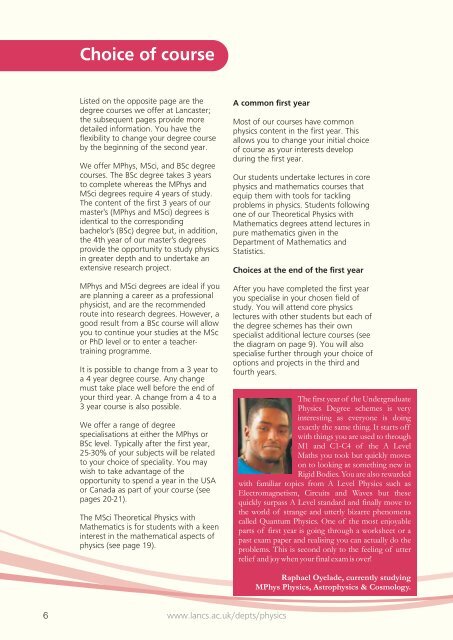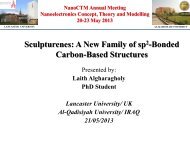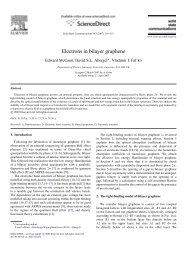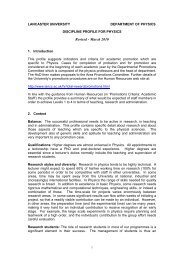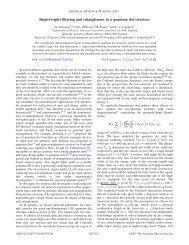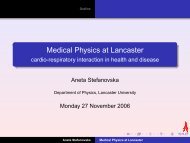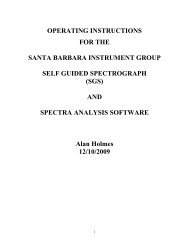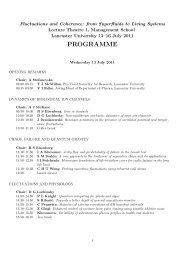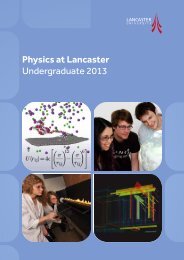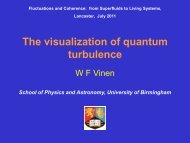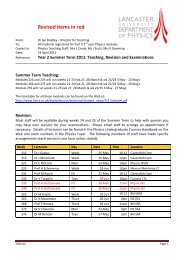Theoretical Physics - Physics at Lancaster University
Theoretical Physics - Physics at Lancaster University
Theoretical Physics - Physics at Lancaster University
You also want an ePaper? Increase the reach of your titles
YUMPU automatically turns print PDFs into web optimized ePapers that Google loves.
Choice of course<br />
Listed on the opposite page are the<br />
degree courses we offer <strong>at</strong> <strong>Lancaster</strong>;<br />
the subsequent pages provide more<br />
detailed inform<strong>at</strong>ion. You have the<br />
flexibility to change your degree course<br />
by the beginning of the second year.<br />
We offer MPhys, MSci, and BSc degree<br />
courses. The BSc degree takes 3 years<br />
to complete whereas the MPhys and<br />
MSci degrees require 4 years of study.<br />
The content of the first 3 years of our<br />
master's (MPhys and MSci) degrees is<br />
identical to the corresponding<br />
bachelor's (BSc) degree but, in addition,<br />
the 4th year of our master's degrees<br />
provide the opportunity to study physics<br />
in gre<strong>at</strong>er depth and to undertake an<br />
extensive research project.<br />
MPhys and MSci degrees are ideal if you<br />
are planning a career as a professional<br />
physicist, and are the recommended<br />
route into research degrees. However, a<br />
good result from a BSc course will allow<br />
you to continue your studies <strong>at</strong> the MSc<br />
or PhD level or to enter a teachertraining<br />
programme.<br />
It is possible to change from a 3 year to<br />
a 4 year degree course. Any change<br />
must take place well before the end of<br />
your third year. A change from a4toa<br />
3 year course is also possible.<br />
We offer a range of degree<br />
specialis<strong>at</strong>ions <strong>at</strong> either the MPhys or<br />
BSc level. Typically after the first year,<br />
25-30% of your subjects will be rel<strong>at</strong>ed<br />
to your choice of speciality. You may<br />
wish to take advantage of the<br />
opportunity to spend a year in the USA<br />
or Canada as part of your course (see<br />
pages 20-21).<br />
The MSci <strong>Theoretical</strong> <strong>Physics</strong> with<br />
M<strong>at</strong>hem<strong>at</strong>ics is for students with a keen<br />
interest in the m<strong>at</strong>hem<strong>at</strong>ical aspects of<br />
physics (see page 19).<br />
A common first year<br />
Most of our courses have common<br />
physics content in the first year. This<br />
allows you to change your initial choice<br />
of course as your interests develop<br />
during the first year.<br />
Our students undertake lectures in core<br />
physics and m<strong>at</strong>hem<strong>at</strong>ics courses th<strong>at</strong><br />
equip them with tools for tackling<br />
problems in physics. Students following<br />
one of our <strong>Theoretical</strong> <strong>Physics</strong> with<br />
M<strong>at</strong>hem<strong>at</strong>ics degrees <strong>at</strong>tend lectures in<br />
pure m<strong>at</strong>hem<strong>at</strong>ics given in the<br />
Department of M<strong>at</strong>hem<strong>at</strong>ics and<br />
St<strong>at</strong>istics.<br />
Choices <strong>at</strong> the end of the first year<br />
After you have completed the first year<br />
you specialise in your chosen field of<br />
study. You will <strong>at</strong>tend core physics<br />
lectures with other students but each of<br />
the degree schemes has their own<br />
specialist additional lecture courses (see<br />
the diagram on page 9) . You will also<br />
specialise further through your choice of<br />
options and projects in the third and<br />
fourth years.<br />
The first year of the Undergradu<strong>at</strong>e<br />
<strong>Physics</strong> Degree schemes is very<br />
interesting as everyone is doing<br />
exactly the same thing. It starts off<br />
with things you are used to through<br />
M1 and C1-C4 of the A Level<br />
M<strong>at</strong>hs you took but quickly moves<br />
on to looking <strong>at</strong> something new in<br />
Rigid Bodies. You are also rewarded<br />
with familiar topics from A Level <strong>Physics</strong> such as<br />
Electromagnetism, Circuits and Waves but these<br />
quickly surpass A Level standard and finally move to<br />
the world of strange and utterly bizarre phenomena<br />
called Quantum <strong>Physics</strong>. One of the most enjoyable<br />
parts of first year is going through a worksheet or a<br />
past exam paper and realising you can actually do the<br />
problems. This is second only to the feeling of utter<br />
relief and joy when your final exam is over!<br />
Raphael Oyelade, currently studying<br />
MPhys <strong>Physics</strong>, Astrophysics & Cosmology.<br />
6<br />
www.lancs.ac.uk/depts/physics


